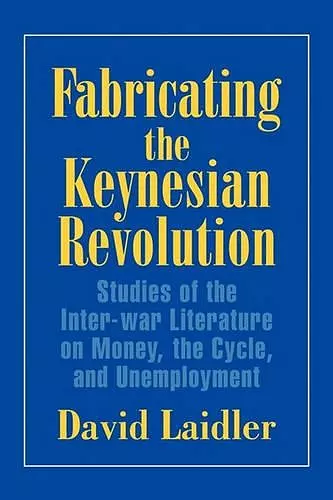Fabricating the Keynesian Revolution
Studies of the Inter-war Literature on Money, the Cycle, and Unemployment
Format:Hardback
Publisher:Cambridge University Press
Published:28th Mar '99
Currently unavailable, and unfortunately no date known when it will be back
This hardback is available in another edition too:
- Paperback£38.00was £38.00(9780521645966)

Laidler surveys the writings of a large number of economists in the inter-war years and argues that the 'Keynesian Revolution' is a myth, and that the 'new economics' was a careful and selective synthesis of an 'old economics' which had been developing for twenty years or more.Examining the emergence, in the inter-war years, of what came to be called 'Keynesian macroeconomics'. This study accepts the novelty of the latter, as represented by the IS-LM model, which in various forms came to dominate the sub-discipline for three decades. It argues, however, that this model did not represent a radical change in economic thinking but rather an extremely selective synthesis of those which had permeated the preceding literature, including Keynes's own contributions to it, not least the General Theory. Hence the book questions the appropriateness of thinking of this development as the outcome of a 'Keynesian Revolution' in economic thought, partly because the most radical aspects of Keynes's own intended contribution were excluded from it, but mainly because IS-LM is better viewed as the end result of twenty years or more of intellectual development to which many others besides Keynes contributed.
"Natura non facit saltum. So said Marshall, and once again he's been proven correct. Without denigrating the very real contributions of John Maynard Keynes, David Laidler demonstrates conclusively that, far from inventing an entirely novel theory to challenge a dead orthodoxy, Keynes fabricated his theory from the ample materials provided by a lively and diverse interwar literature. Fabricating the Keynesian Revolution sets Keynes's work in the theoretical context of its period as no other book has. It is must reading not only for historians of economics but for anyone who wants to understand how modern macroeconomics came to be." Neil Skaggs, Illinois State University
"For persons entering economics in the 1940s, 'Keynesian' economics was shockingly 'revolutionary' because it was shockingly activist by comparison with all earlier, other than Marxian, economic teaching. Laidler's book brilliantly traces the 'fabrification' of a textbook revolution in activist economics which in one generation replaced thoughtful Marshallian courses in economic inquiry with courses in soapbox oratory about economic fluctuations. Laidler's scholarship is impeccable; even the most knowledgable professional has much to learn from reading his book." Robert Clower, University of South Carolina
"David Laidler has written an important, scholarly, and controversial study of the diverse strands of monetary economics between the wars, showing how Austrian, Swedish, American institutionalist, and Marshallian traditions of cycle analysis, and Keynes's own earlier work, contributed along with Keynes's General Theory to the emergence of modern macroeconomics. Laidler's wide-ranging, learned, and provocative analysis deepens our understanding of the richness of interwar macroeconomics, and will stimulate a lively debate on the role of Keynes in the development of macroeconomics." Robert Dimand, Brock University, Canada
"...brilliantly conceived and splendidly executed...No one interested in the economics or the economic history of the interwar period should fail to read it." Journal of Economics, Susan Showson, University of Toronto
ISBN: 9780521641739
Dimensions: 229mm x 152mm x 25mm
Weight: 760g
400 pages